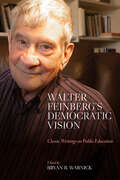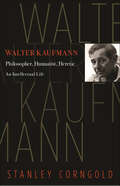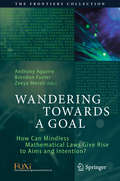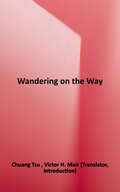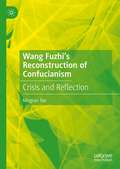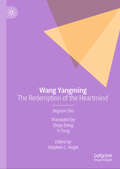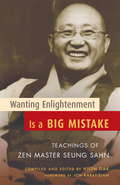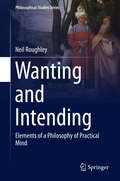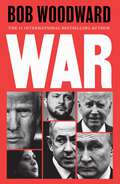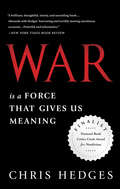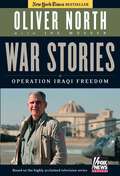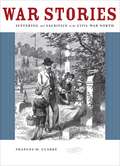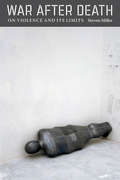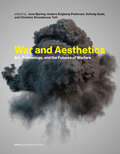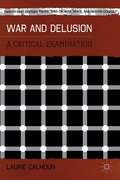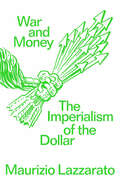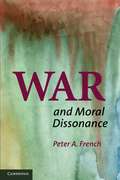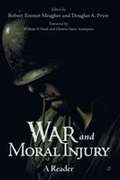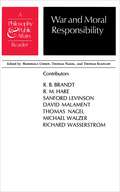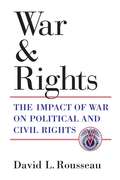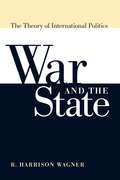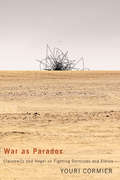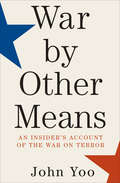- Table View
- List View
Walter Feinberg’s Democratic Vision: Classic Writings on Public Education (SUNY series, Horizons in the Philosophy of Education)
by Walter FeinbergCollects Walter Feinberg's classic writings on the meaning of democracy for public education.For over fifty years, Walter Feinberg has been a leader in interpreting democracy in and its meaning for public education. In this collection, Feinberg explores the question of how to study education, the necessary role of history and philosophy in this endeavor, and the need for educational theorists to engage with the lived realities of students, parents, and teachers through philosophical anthropology. He demonstrates a particular way of paying attention to public education that brings an interpretive sensitivity for others to the big philosophical questions of what public schooling should be in democratic societies. Feinberg explores many of the central questions that vex educational policy and practice: What should be the purpose of public schools? What should we think of school choice proposals? What are the relationships between religion and public schools? Should schools promote an American identity? How should we think about affirmative action? In this tour of educational ideas, democracy is the central concern, as it both presents questions that demand answers and becomes an approach to studying education with rigor and sensitivity.
Walter Kaufmann: Philosopher, Humanist, Heretic: An Intellectual Life
by Stanley CorngoldThe first complete account of the ideas and writings of a major figure in twentieth-century intellectual lifeWalter Kaufmann (1921–1980) was a charismatic philosopher, critic, translator, and poet who fled Nazi Germany at the age of eighteen, emigrating alone to the United States. He was astonishingly prolific until his untimely death at age fifty-nine, writing some dozen major books, all marked by breathtaking erudition and a provocative essayistic style. He single-handedly rehabilitated Nietzsche’s reputation after World War II and was enormously influential in introducing postwar American readers to existentialism. Until now, no book has examined his intellectual legacy.Stanley Corngold provides the first in-depth study of Kaufmann’s thought, covering all his major works. He shows how Kaufmann speaks to many issues that concern us today, such as the good of philosophy, the effects of religion, the persistence of tragedy, and the crisis of the humanities in an age of technology. Few scholars in modern times can match Kaufmann’s range of interests, from philosophy and literature to intellectual history and comparative religion, from psychology and photography to art and architecture. Corngold provides a heartfelt portrait of a man who, to an extraordinary extent, transfigured his personal experience in the pages of his books.This original study, both appreciative and critical, is the definitive intellectual life of one of the twentieth century’s most engaging yet neglected thinkers. It will introduce Kaufmann to a new generation of readers and serves as a fitting tribute to a scholar’s incomparable libido sciendi, or lust for knowledge.
Wandering Towards a Goal: How Can Mindless Mathematical Laws Give Rise To Aims And Intention? (The Frontiers Collection)
by Anthony Aguirre Brendan Foster Zeeya MeraliThis collection of prize-winning essays addresses the controversial question of how meaning and goals can emerge in a physical world governed by mathematical laws. What are the prerequisites for a system to have goals? What makes a physical process into a signal? Does eliminating the homunculus solve the problem? The three first-prize winners, Larissa Albantakis, Carlo Rovelli and Jochen Szangolies tackle exactly these challenges, while many other aspects (agency, the role of the observer, causality versus teleology, ghosts in the machine etc.) feature in the other award winning contributions. All contributions are accessible to non-specialists.These seventeen stimulating and often entertaining essays are enhanced versions of the prize-winning entries to the FQXi essay competition in 2017.The Foundational Questions Institute, FQXi, catalyzes, supports, and disseminates research on questions at the foundations of physics and cosmology, particularly new frontiers and innovative ideas integral to a deep understanding of reality, but unlikely to be supported by conventional funding sources.
Wandering on the Way: Early Taoist Tales and Parables of Chuang Tzu
by Tzu ChuangIn this vivid, contemporary translation, Victor Mair captures the quintessential life and spirit of Chuang Tzu while remaining faithful to the original text.
Wang Fuzhi’s Reconstruction of Confucianism: Crisis and Reflection
by Mingran TanWang Fuzhi (1619-1692), a Ming loyalist, was forced to find solutions for both cultural and political crises of his time. In this book Mingran Tan provides a comprehensive review of Wang Fuzhi’s understanding of historical events and his interpretation of the Confucian classics. Tan explains what kind of Confucian system Wang Fuzhi was trying to construct according to his motto, “The Six Classics require me to create something new”. He sought a basis for Confucian values such as filial piety, humanity and ritual propriety from political, moral and cosmological perspectives, arguing that they could cultivate a noble personality, beatify political governance, and improve social and cosmological harmony. This inspired Wang Fuzhi’s attempt to establish a syncretic blend of the three branches of Neo-Confucianism, i.e., Zhu Xi’s (1130-1200) philosophy of principle , Wang Yangming’s (1472-1529) philosophy of mind and Zhang Zai’s (1020-1077) philosophy of qi (material force). The most thorough work on Wang Fuzhi available in English, this study corrects some general misunderstanding of the nature of Wang Fuzhi’s philosophy and helps readers to understand Wang Fuzhi from an organic perspective. Building upon previous scholars’ research on Wang Fuzhi’s notion of moral cultivation, Tan gives a comprehensive understanding of how Wang Fuzhi improves social and cosmological harmony through compliance with Confucian rituals.
Wang Yangming: The Redemption of the Heartmind
by Jingnan ShuThis book offers a dynamic portrayal of the preeminent Neo-Confucian Wang Yangming's philosophy of the heartmind. Through the life and times of this prodigious Ming Dynasty figure, from his early literary achievements and pursuit of Buddhist and Daoist ideals to his later success in warfare, virtuous leadership, and tragic struggle against dynastic corruption, the author traces the many stages of the development and application of Wang’s Confucian thinking. Its systematic study of the context through which Wang’s thought matured and was received includes detailed accounts of his inheritance of earlier heartmind philosophy and his pedagogical as well as personal relations with many distinguished disciples. A concise edition of the author’s three-volume Biography of Yangming: The Redemption of Mind, this book draws on a wealth of new information to overturn the traditional understanding of Wang Yangming that dominated the past 500 years.
Wanting Enlightenment Is a Big Mistake: Teachings of Zen Master Seung San
by Seung Sahn Hyon Gak SunimA major figure in the transmission of Zen to the West, Zen Master Seung Sahn was known for his powerful teaching style, which was direct, surprising, and often humorous. He taught that Zen is not about achieving a goal, but about acting spontaneously from "don't-know mind." It is from this "before-thinking" nature, he taught, that true compassion and the desire to serve others naturally arises. This collection of teaching stories, talks, and spontaneous dialogues with students offers readers a fresh and immediate encounter with one of the great Zen masters of the twentieth century.
Wanting and Intending
by Neil RoughleyThis book aims to answer two simple questions: what is it to want and what is it to intend? Because of the breadth of contexts in which the relevant phenomena are implicated and the wealth of views that have attempted to account for them, providing the answers is not quite so simple. Doing so requires an examination not only of the relevant philosophical theories and our everyday practices, but also of the rich empirical material that has been provided by work in social and developmental psychology. The investigation is carried out in two parts, dedicated to wanting and intending respectively. Wanting is analysed as optative attitudinising, a basic form of subjective standard-setting at the core of compound states such as 'longings', 'desires', 'projects' and 'whims'. The analysis is developed in the context of a discussion of Moore-paradoxicality and deepened through the examination of rival theories, which include functionalist and hedonistic conceptions as well as the guise-of-the-good view and the pure entailment approach, two views popular in moral psychology. In the second part of the study, a disjunctive genetic theory of intending is developed, according to which intentions are optative attitudes on which, in one way or another, the mark of deliberation has been conferred. It is this which explains intention's subjection to the requirements of practical rationality. Moreover, unlike wanting, intending turns out to be dependent on normative features of our life form, in particular on practices of holding responsible. The book will be of particular interest to philosophers and psychologists working on motivation, goals, desire, intention, deliberation, decision and practical rationality.
War
by Bob WoodwardChosen by WATERSTONES as one of their BEST POLITICS BOOKS of 2024 Two-time Pulitzer prize winner Bob Woodward tells the revelatory, behind-the-scenes story of three wars – Ukraine, the Middle East and the struggle for the American presidency.War is an intimate and sweeping account of one of the most tumultuous periods in presidential politics and American history. We see President Joe Biden and his top advisers in tense conversations with Russian president Vladimir Putin, Israeli prime minister Benjamin Netanyahu and Ukrainian president Volodymyr Zelensky. We also see Donald Trump, conducting a shadow presidency and seeking to regain political power. With unrivalled, inside-the-room reporting, Woodward shows President Biden&’s approach to managing the war in Ukraine, the most significant land war in Europe since World War II, and his tortured path to contain the bloody Middle East conflict between Israel and the terrorist group Hamas. Woodward reveals the extraordinary complexity and consequence of wartime back-channel diplomacy and decision-making to deter the use of nuclear weapons and a rapid slide into World War III. The raw cage-fight of politics accelerates as Americans prepare to vote in 2024, starting between President Biden and Trump, and ending with the unexpected elevation of Vice President Kamala Harris as the Democratic nominee for president.War provides an unvarnished examination of the vice president as she tries to embrace the Biden legacy and policies while beginning to chart a path of her own as a presidential candidate. Woodward&’s reporting once again sets the standard for journalism at its most authoritative and illuminating.
War Is a Force that Gives Us Meaning
by Chris Hedges<p>As a veteran war correspondent, Chris Hedges has survived ambushes in Central America, imprisonment in Sudan, and a beating by Saudi military police. He has seen children murdered for sport in Gaza and petty thugs elevated into war heroes in the Balkans. Hedges, who is also a former divinity student, has seen war at its worst and knows too well that to those who pass through it, war can be exhilarating and even addictive: “It gives us purpose, meaning, a reason for living.” <p>Drawing on his own experience and on the literature of combat from Homer to Michael Herr, Hedges shows how war seduces not just those on the front lines but entire societies—corrupting politics, destroying culture, and perverting basic human desires. Mixing hard-nosed realism with profound moral and philosophical insight, <i>War Is a Force that Gives Us Meaning</i> is a work of terrible power and redemptive clarity whose truths have never been more necessary.</p>
War Powers: How the Imperial Presidency Hijacked the Constitution
by Peter IronsPeter Irons is a well known political and legal historian at University of California San Diego. His latest work traces the rise of the imperial presidency and how it has trumped Congress's constitutional power of declaring war. Irons sees this as a dangerous usurption of Congress's powers, and a drift towards militarism and an unaccountable presidency.
War Stories: Operation Iraqi Freedom (War Stories Series)
by Oliver NorthThe mainstream media are trying to discredit our victory in Iraq by saying there was no reason to take out Saddam. But Oliver North knows better. He was there.<P><P> Embedded with Marine and Army units for FOX News Channel during Operation Iraqi Freedom, North (himself a decorated combat veteran) vividly tells the story his camera gave us glimpses of during the campaign to liberate Iraq. This updated edition features a new chapter detailing the events after the end of major hostilities--including the capture of Saddam Hussein--and brand-new action photos straight from the front line.
War Stories: Suffering and Sacrifice in the Civil War North
by Frances M. ClarkeThe American Civil War is often seen as the first modern war, not least because of its immense suffering. Yet unlike later conflicts, it did not produce an outpouring of disillusionment or cynicism, as most people continued to portray the war in highly sentimental and patriotic terms. While scholars typically dismiss this everyday writing as simplistic or naïve, Frances M. Clarke argues that we need to reconsider the letters, diaries, songs, and journalism penned by Union soldiers and their caregivers to fully understand the war’s impact and meaning. In War Stories, Clarke revisits the most common stories that average Northerners told in hopes of redeeming their suffering and loss—stories that enabled people to make sense of their hardship, and to express their beliefs about religion, community, and personal character. From tales of Union soldiers who died heroically to stories of tireless volunteers who exemplified the Republic’s virtues, War Stories sheds new light on this transitional moment in the history of war, emotional culture, and American civic life.
War after Death: On Violence and Its Limits
by Steven MillerWar after Death considers forms of violence that regularly occur in actual wars but do not often factor into the stories we tell about war, which revolve invariably around killing and death. Recent history demonstrates that body counts are more necessary than ever, but the fact remains that war and death is only part of the story—an essential but ultimately subordinate part. Beyond killing, there is no war without attacks upon the built environment, ecosystems, personal property, artworks, archives, and intangible traditions.Destructive as it may be, such violence is difficult to classify because it does not pose a grave threat to human lives. Nonetheless, the book argues that destruction of the nonhuman or nonliving is a constitutive dimension of all violence—especially forms of extreme violence against the living such as torture and rape; and it examines how the language and practice of war are transformed when this dimension is taken into account.Finally, War after Death offers a rethinking of psychoanalytic approaches to war and the theory of the death drive that underlies them.
War and Aesthetics: Art, Technology, and the Futures of Warfare (Prisms: Humanities and War #1)
by Jens Bjering, Anders Engberg-Pedersen, Solveig Gade, and Christine Strandmose ToftA provocative edited collection that takes an original approach toward the black box of military technology, surveillance, and AI—and reveals the aesthetic dimension of warfare.War and Aesthetics gathers leading artists, political scientists, and scholars to outline the aesthetic dimension of warfare and offer a novel perspective on its contemporary character and the construction of its potential futures. Edited by a team of four scholars, Jens Bjering, Anders Engberg-Pedersen, Solveig Gade, and Christine Strandmose Toft, this timely volume examines warfare through the lens of aesthetics, arguing that the aesthetic configurations of perception, technology, and time are central to the artistic engagement with warfare, just as they are key to military AI, weaponry, and satellite surveillance.People mostly think of war as the violent manifestation of a political rationality. But when war is viewed through the lens of aesthesis—meaning perception and sensibility—military technology becomes an applied science of sensory cognition. An outgrowth of three war seminars that took place in Copenhagen between 2018 and 2021, War and Aesthetics engages in three main areas of inquiry—the rethinking of aesthetics in the field of art and in the military sphere; the exploration of techno-aesthetics and the wider political and theoretical implications of war technology; and finally, the analysis of future temporalities that these technologies produce. The editors gather various traditions and perspectives ranging from literature to media studies to international relations, creating a unique historical and scientific approach that broadly traces the entanglement of war and aesthetics across the arts, social sciences, and humanities from ancient times to the present. As international conflict looms between superpowers, War and Aesthetics presents new and illuminating ways to think about future conflict in a world where violence is only ever a few steps away.ContributorsLouise Amoore, Ryan Bishop, Jens Bjering, James Der Derian, Anthony Downey, Anders Engberg-Pedersen, Solveig Gade, Mark B. Hansen, Caroline Holmqvist, Vivienne Jabri, Caren Kaplan, Phil Klay, Kate McLoughlin, Elaine Scarry, Christine Strandmose Toft, Joseph Vogl, Arkadi Zaides
War and Delusion
by Laurie CalhounCalhoun examines the centuries-old paradigm of just war theory to determine whether modern 'just war' rationalizations constitute sound justifications or pro-military propaganda. Her work reveals how the practice of modern war contradicts the most basic values and principles of modern Western democracies.
War and Money: The Imperialism of the Dollar
by Maurizio LazzaratoThe business of imperial conflict: Why capitalism needs war.Maurizio Lazzarato&’s War and Money explores the connections between capitalist expansion, international economic conflict, and war, via an analysis of the imperialism of the American dollar. He examines why contemporary left-wing theorists such as Michel Foucault and Antonio Negri have failed to recognize war as a fundamental aspect of capitalism. Renewed readings of Marx, Lenin, and Rosa Luxemburg argue for class struggle against capitalist war as a fundamental aspect of leftist theory.
War and Moral Dissonance
by Peter A. FrenchThis collection of essays, inspired by the author's experience teaching ethics to Marine and Navy chaplains during the Iraq War, examines the moral and psychological dilemmas posed by war. The first section deals directly with Dr Peter A. French's teaching experience and the specific challenges posed by teaching applied and theoretical ethics to men and women wrestling with the immediate and personal moral conflicts occasioned by the dissonance of their duties as military officers with their religious convictions. The following chapters grew out of philosophical discussions with these chaplains regarding specific ethical issues surrounding the Iraq War, including the nature of moral evil, forgiveness, mercy, retributive punishment, honour, torture, responsibility and just war theory. This book represents a unique viewpoint on the philosophical problems of war, illuminating the devastating toll combat experiences take on both an individual's sense of identity and a society's professed moral code.
War and Moral Injury: A Reader
by Robert Emmet Meagher Douglas A. PryerMoral Injury has been called the "signature wound" of today's wars. It is also as old as the human record of war, as evidenced in the ancient war epics of Greece, India, and the Middle East. But what exactly is Moral Injury? What are its causes and consequences? What can we do to prevent or limit its occurrence among those we send to war? And, above all, what can we do to help heal afflicted warriors? This landmark volume provides an invaluable resource for those looking for answers to these questions. Gathered here are some of the most far-ranging, authoritative, and accessible writings to date on the topic of Moral Injury. Contributors come from the fields of psychology, theology, philosophy, psychiatry, law, journalism, neuropsychiatry, classics, poetry, and, of course, the profession of arms. Their voices find common cause in informing the growing, international conversation on war and war's deepest and most enduring invisible wound. Few may want to have this myth-challenging, truth-telling conversation, but it is one we must have if we truly wish to help those we send to fight our wars.
War and Moral Responsibility: A Philosophy and Public Affairs Reader (Philosophy And Public Affairs Readers Ser.)
by Thomas Nagel Marshall Cohen Thomas ScanlonThis remarkably rich collection of articles focuses on moral questions about war. The essays, originally published in Philosophy & Public Affairs, cover a wide range of topics from several points of view by writers from the fields of political science, philosophy, and law. The discussion of war and moral responsibility falls into three general categories: problems of political and military choice, problems about the relation of an individual to the actions of his government, and more abstract ethical questions as well. The first category includes questions about the ethical and legal aspects of war crimes and the laws of war; about the source of moral restrictions on military methods or goals; and about differences in suitability of conduct which may depend on differences in the nature of the opponent. The second category includes questions about the conditions for responsibility of individual soldiers and civilian officials for war crimes, and about the proper attitude of a government toward potential conscripts who reject its military policies. The third category includes disputes between absolutist, deontological, and utilitarian ethical theories, and deals with questions about the existence of insoluble moral dilemmas.
War and Rights: The Impact of War on Political and Civil Rights
by David RousseauWarfare in Europe contributed to the development of the modern state. In response to external conflict, state leaders raised armies and defended borders. The centralization of power, the development of bureaucracies, and the integration of economies all maximized revenue to support war. But how does a persistent external threat affect the development of a strong state? The “Garrison State” hypothesis argues that states that face a severe security threat will become autocracies. Conversely, the “Extraction School,” argues that warfare indirectly promotes the development of democratic institutions. ? Execution of large-scale war requires the mobilization of resources and usually reluctant populations. In most cases, leaders must extend economic or political rights in exchange for resolving the crisis. Large-scale warfare thus expands political participation in the long run. The authors use empirical statistical modeling to show that war decreases rights in the short term, but the longer and bigger a war gets, the rights of the citizenry expand with the conflict. The authors test this argument through historical case studies—Imperial Russia, Austro-Hungarian Dual Monarchy, African Americans in World War I and II, and the Tirailleurs Senegalese in World War I—through the use of large-N statistical studies—Europe 1900–50 and Global 1893–2011—and survey data. The results identify when, where, and how war can lead to the expansion of political rights.
War and the State: The Theory of International Politics
by R. Harrison WagnerWar and the Stateexposes the invalid arguments employed in the unproductive debate about Realism among international relations scholars, as well as the common fallacy of sharply distinguishing between conflict among states and conflict within them. As R. Harrison Wagner demonstrates, any understanding of international politics must be part of a more general study of the relationship between political order and organized violence everywhere--as it was in the intellectual tradition from which modern-day Realism was derived. War and the Statedraws on the insights from Wagner's distinguished career to create an elegantly crafted essay accessible to both students and scholars. "Possibly the most important book on international relations theory since Kenneth Waltz'sTheory of International Politics. " ---James Fearon, Stanford University "This is one of the best books on international relations theory I have read in a very long time. It is required reading for any student of modern IR theory. Once again, Wagner has shown himself to be one of the clearest thinkers in the field today. " ---Robert Powell, Robson Professor of Political Science, University of California, Berkeley "Painting on a vast canvas, and tackling and integrating topics such as state formation, domestic politics, and international conflict, R. Harrison Wagner'sWar and the Stateoffers many brilliant insights into the nature of international relations and international conflict. War and the Statecompellingly highlights the importance of constructing rigorous and valid theorizing and sets a high standard for all students of international relations. The field has much to gain if scholars follow the trail blazed by Wagner in this book. " ---Hein Goemans, University of Rochester R. Harrison Wagner is Professor of Government at the University of Texas.
War as Paradox: Clausewitz and Hegel on Fighting Doctrines and Ethics
by Youri CormierTwo centuries after Carl von Clausewitz wrote On War, it lines the shelves of military colleges around the world and even showed up in an Al Qaeda hideout. Though it has shaped much of the common parlance on the subject, On War is perceived by many as a "metaphysical fog," widely known but hardly read. In War as Paradox, Youri Cormier lifts the fog on this iconic work by explaining its philosophical underpinnings. Building up a genealogy of dialectical war theory and integrating Hegel with Clausewitz as a co-founders of the method, Cormier uncovers a common logic that shaped the fighting doctrines and ethics of modern war. He explains how Hegel and Clausewitz converged on method, but nonetheless arrived at opposite ethics and military doctrines. Ultimately, Cormier seeks out the limits to dialectical war theory and explores the greater paradoxes the method reveals: can so-called "rational" theories of war hold up under the pressures of irrational propositions, such as lone-wolf attacks, the circular logic of a "war to end all wars," or the apparent folly of mutually assured destruction? Since the Second World War, commentators have described war as obsolete. War as Paradox argues that dialectical war theory may be the key to understanding why, despite this, it continues.
War as Paradox: Clausewitz and Hegel on Fighting Doctrines and Ethics (McGill-Queen's Studies in the History of Ideas #67)
by Youri CormierTwo centuries after Carl von Clausewitz wrote On War, it lines the shelves of military colleges around the world and even showed up in an Al Qaeda hideout. Though it has shaped much of the common parlance on the subject, On War is perceived by many as a “metaphysical fog,” widely known but hardly read. In War as Paradox, Youri Cormier lifts the fog on this iconic work by explaining its philosophical underpinnings. Building up a genealogy of dialectical war theory and integrating Hegel with Clausewitz as a co-founders of the method, Cormier uncovers a common logic that shaped the fighting doctrines and ethics of modern war. He explains how Hegel and Clausewitz converged on method, but nonetheless arrived at opposite ethics and military doctrines. Ultimately, Cormier seeks out the limits to dialectical war theory and explores the greater paradoxes the method reveals: can so-called “rational” theories of war hold up under the pressures of irrational propositions, such as lone-wolf attacks, the circular logic of a “war to end all wars,” or the apparent folly of mutually assured destruction? Since the Second World War, commentators have described war as obsolete. War as Paradox argues that dialectical war theory may be the key to understanding why, despite this, it continues.
War by Other Means: An Insider's Account of the War on Terror
by John YooJohn Yoo, the key legal architect of the Bush administration’s response to 9/11, delivers a fascinating insider account of the War on Terror. While America reeled from the cataclysmic events of September 11, 2001, Yoo and a skeletal staff of the Office of Legal Counsel found themselves on the phone with the White House. In a series of memos, Yoo offered his legal opinions on the president’s authority to respond, and in the process had an almost unmatched impact on America's fight against terrorism. His analysis led to many of the Bush administration’s most controversial policies, including detention at Guantanamo Bay, coercive interrogation, military trials for terrorists, preemptive attacks, and the National Security Agency’s wiretapping program. In fascinating detail, Yoo takes us inside the corridors of power and examines specific cases, from John Walker Lindh and Jose Padilla to an American al-Qaeda leader assassinated by a CIA pilotless drone in the deserts of Yemen. In a midterm election year, when the controversies over the president’s handling of the War on Terror are sure to wage more forcefully than ever before, John Yoo’s War by Other Means is set to become one of the fall’s most talked about books.
